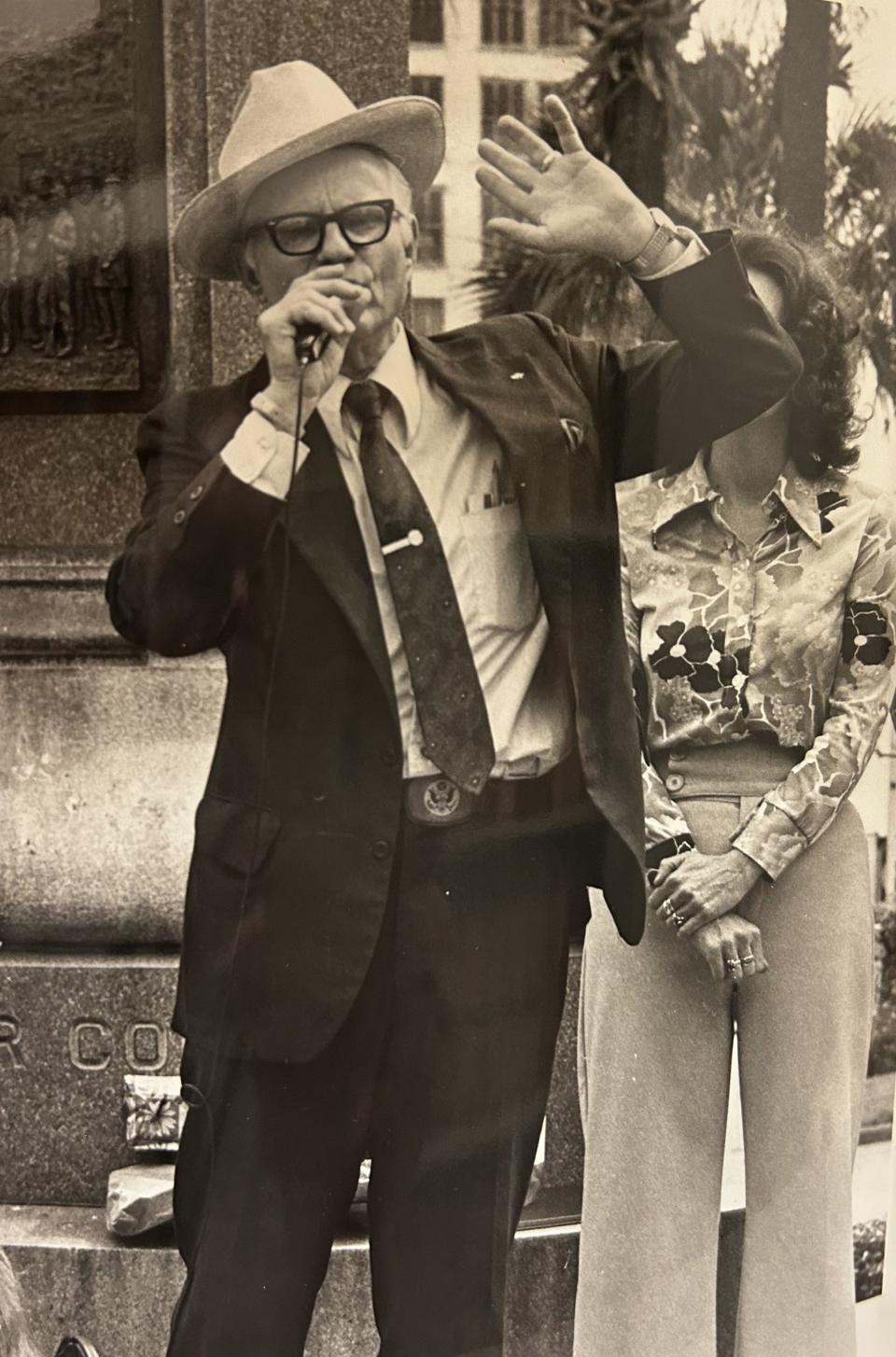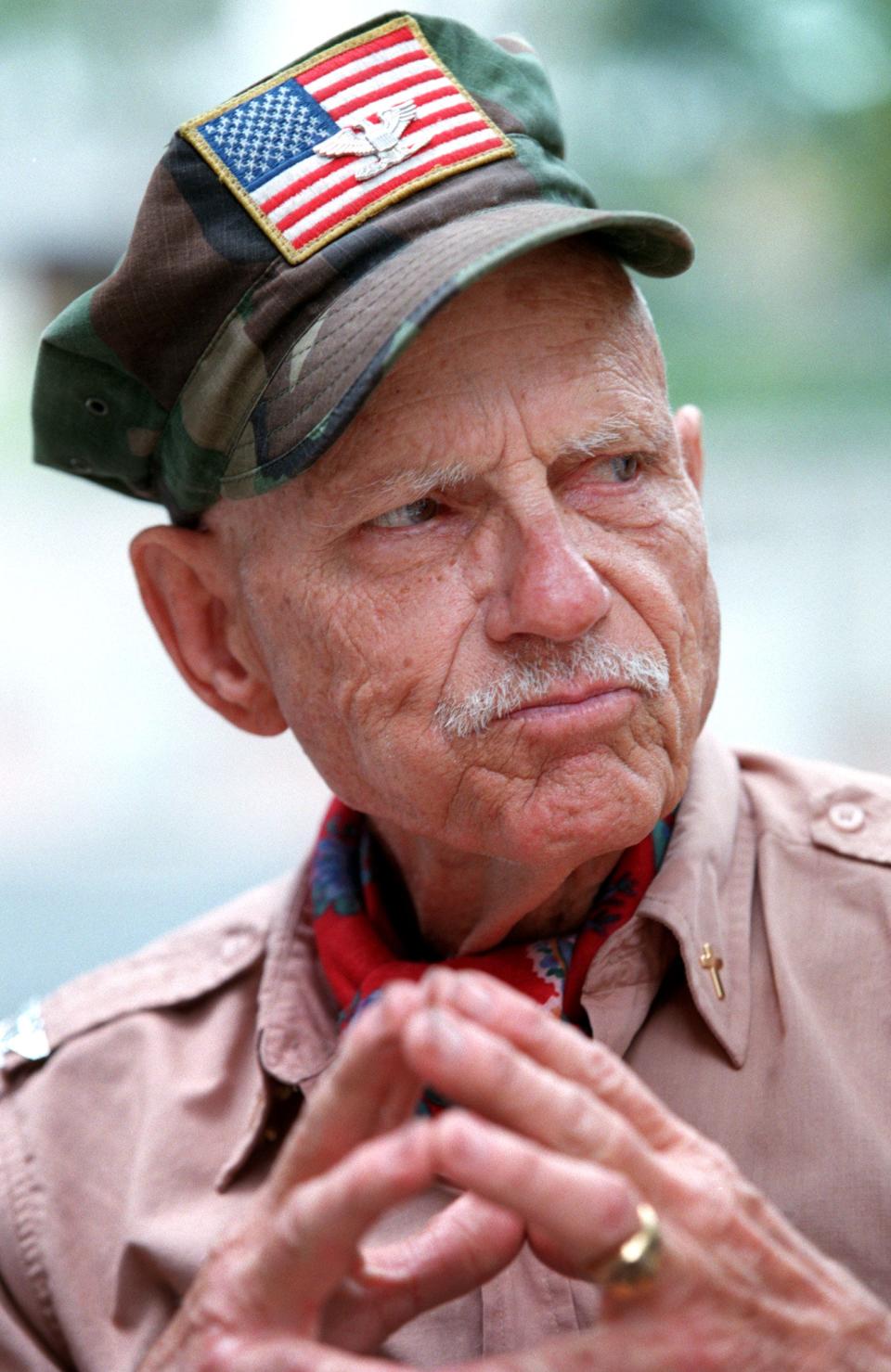Notorious Jacksonville segregationist featured in 'The Culture Wars of Warren Folks'

Jacksonville author Tim Gilmore often dives into some of the darker or more eccentric corners of the city's recent history. Just a few examples: some of the city's most notorious murder cases, sexual abuse at a megachurch, a man known as the hermit of Goat Island and a woman who handwrote more than 8,000 pages chronicling Jacksonville's citizens.
His newest book, "The Culture Wars of Warren Folks," looks at a white barber who was a self-proclaimed racist segregationist, an anti-Semite and a leader of what he called the Conservative Church of Christ and the Conservative Citizens Council.
Warren Folks "successfully stayed in the forefront of the news for several decades," Gilmore said, by waving inflammatory placards, pestering local reporters, choosing hot-button issues, propagating conspiracy theories and possessing no apparent shame.
Indeed, this newspaper's archives has several thick envelopes detailing Folks and his exploits, which Gilmore leaned on heavily for his research.
"Just about anybody who was in Jax in the '60s and '70s and '80s and was part of whatever was happening in Jacksonville has a memory of him," he said.
A book launch event for "The Culture Wars of Warren Folks" will be Thursday at 5:30 p.m. at the Jacksonville Historical Society's headquarters at Old St. Andrew's Church: 317 A. Philip Randolph Blvd.

After Folks died, at 91, in 2011, the Times-Union's Sandy Strickland wrote that he had been "the face of segregation in Jacksonville for several decades," noting his often ugly and usually lonely protest/publicity stunts.
"He was a perennial candidate for office but lost every race he entered. His protest signs were familiar sights on Jacksonville streets, and his aggressive picketing resulted in numerous arrests for disturbing the peace," Strickland wrote.
Warren Folks 1920 - 2011: Retired barber was Jacksonville's face of segregation
The obituary went on to recall the national attention Folks drew in 1981 when he persuaded California authorities to exhume the body of John Spenkelink, who was the first person executed in Florida after capital punishment was reinstated in 1976. Folks insisted he'd been murdered before he was strapped in the electric chair. The autopsy disproved that.
The article further recalled a couple of his high-profile arrests, including a conviction for disrupting discipline at Naval Air Station Jacksonville that led to a 150-day federal prison sentence in 1975. In 1977 he was arrested again after going to Mayor Hans Tanzler's office with an unloaded shotgun and two shells in his pocket.
Strickland noted that by 1996 Folks was homeless after being evicted from a primarily Black public housing complex after he threatened employees and forced racist literature on residents.
Culture wars resonate
Gilmore, who teaches English at Florida State College at Jacksonville, said he is always interested in what he calls "extreme characters" from the city's past, as explored in his books and his website, JaxPsychoGeo. Yet he still contemplated expending the necessary energy — physical and mental — to create a book on someone like Folks.
"Does the community need, does anybody need, a biography of this self-avowed white supremacist? Then I thought, yeah, actually it does, because so many of the things that seem brand new, in Florida politics and national politics, have old roots.”
You see that in the "culture wars" reference in the book title.

“Race was always his main trigger but you could always see that, as national politics shifted in different ways, he shifted with them too," Gilmore said, adding that Folks often took extreme positions on "the social issues that animate much of the modern-day conservative movement."
He attacked the news media, abortion rights and attempts to expand voting rights, and set his sights on the LGBT community in the 1980s and 1990s. After losing another election that was not even remotely close, he claimed the race was stolen from him by “computer fraud.”
Mickey Spillane vs. Warren Folks
While researching book bans, Gilmore came across a particularly colorful episode in Folks' campaigns when he went after hardboiled detective writer Mickey Spillane, who had used a racy photo of his much younger wife\for the cover of his 1972 novel, "The Erection Set."
Folks, who at that point called himself head of the Conservative Citizens Council, attacked the city's public library for including the book on its shelves and called for extreme measures to purge the library of what he considered objectionable material.
Dollar General gunman had manifestos: What we know about the shooter, Ryan Palmeter
"He wanted the city to stop funding the city library system until every book in the public library system has been screened," Gilmore said. "When he did this in the early '70s it seems so extreme, yet here we are again with some of the same kind of ideas that, a few years ago, nobody would have thought would come around again.”
Enjoying the publicity back then, the Spillanes came to Jacksonville, where the author poked fun at Folks, saying "Wait until he sees the next one!"
Gilmore then writes: "The cover for Spillane's 1973 novel 'The Last Cop Out' would feature his wife's bare buttocks, complete with tan lines, one hip thrust to the side."
Electroshocks and Bikini Atoll
For his book, Gilmore managed to reach Folks' two daughters and explores their troubled relationships with a troubled man. After speaking with them, he felt protective of them and sympathetic.
"I think it's fair to say he’s haunted them most of their lives," he said.
"The Culture Wars of Warren Folks" also addresses Folks' apparent mental health issues (Folks himself said he'd been institutionalized and had undergone electroshock treatments); his experiences in the Navy (he may have witnessed the nuclear test at Bikini Atoll in the Pacific); and his upbringing by a father who preached racist sermons in interior Florida.

"I think it’s really important not to just say, look at this one extreme, crazy guy, and ignore the fact that he is also the symptom of a lot of factors in the culture that led to him being the person he was," Gilmore said. "That's really important, otherwise we can just write these things off."
Gilmore never met and talked with Folks, but he is pretty sure he came across him in the early 1990s at the old Jacksonville Landing. By that point in his life, Folks had taken to wearing camouflage fatigues, and Gilmore has a distinct memory of an old man on a button-pushing, in-your-face crusade of his own design.
"I distinctly remember this horribly wizened character in fatigues, holding this sign about all the things said about Bill Clinton all those years ago," Gilmore said. "He hated Bill Clinton."
This article originally appeared on Florida Times-Union: Jacksonville's face of segregation featured in book by FCSJ professor

